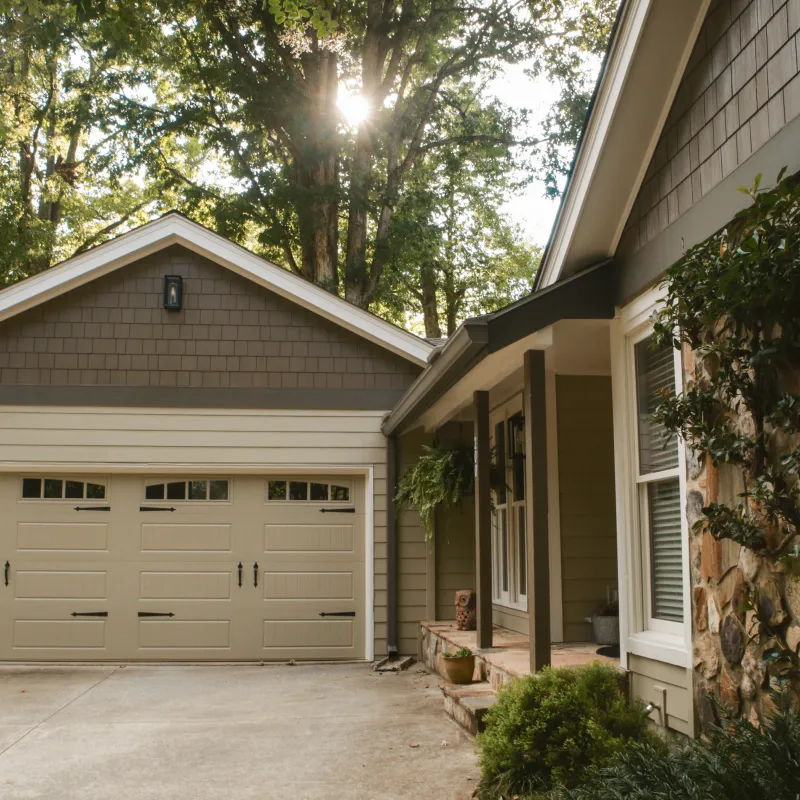Choosing the Right Exterior Contractor and Type of Contract
Embarking on a home improvement project can be exciting, but it can also feel like playing a game of roulette with your budget and exterior contractor. Hidden costs and unexpected surprises can quickly derail even the best-planned projects. At Nelson Exteriors, we believe that knowledge is power. Here are some ways homeowners can protect themselves from financial pitfalls during a home exterior project.
The Type of Contract Matters
The contract you sign can make or break your budget. Here are a few common types of contracts and their potential pitfalls:
Time & Materials Contract
With a Time and Materials (T&M) contract, homeowners pay for the hours worked by the contractor and their crew at an agreed-upon hourly rate, which constitutes the labor costs. Additionally, all materials needed for the project are charged at cost, covering everything from lumber and shingles to paint and tools.
Advantages:
- Flexibility: T&M contracts allow for adjustments to be made throughout the project without needing to revise the contract. This can be beneficial if the scope of work changes.
- Transparency: Homeowners can see exactly what they are being charged for in terms of both labor and materials.
Potential Downsides:
- Budget Uncertainty: Because costs are based on the actual time spent and materials used, the final cost can be uncertain and potentially exceed initial estimates. This can be a major concern for Atlanta homeowners due to Georgia's unpredictable weather.
- Incentive Issues: There may be less incentive for the contractor to work efficiently, as they are paid for the time they spend on the project.
- Monitoring: Homeowners may need to be more involved in monitoring progress and expenses to avoid unexpected charges.
Cost Plus Contract
A cost-plus contract with a homebuilder is an agreement where the homeowner pays for the actual costs of the project plus an additional fee, usually a percentage of the costs. Here's how it works:
- Actual Costs Covered: The homeowner pays for all direct costs associated with the construction, including materials, labor, and other expenses.
- Markup Fee: On top of those actual costs, the builder adds a predetermined percentage (commonly around 10-20%) as their profit margin.
- Transparency: This type of contract often provides detailed accounting, allowing the homeowner to see exactly what they are being charged for materials and labor.
- Flexibility: Cost-plus contracts can offer flexibility for changes during the project since the homeowner can make adjustments without needing a new contract.
Potential Downsides
- Budget Overruns: Because the homeowner is responsible for the actual costs plus the markup, the final price can be higher than initially anticipated if costs increase or if the project takes longer than expected.
- Less Cost Control: Homeowners may have less control over costs, as the builder might not have a strong incentive to minimize expenses.
Fixed Price Contract
A fixed price contract is an agreement where the total project cost is established upfront and remains unchanged, regardless of actual expenses. Any changes to the scope require a change order, which may adjust the cost. The contractor assumes the risk for cost overruns, meaning they cannot charge extra unless changes are formally agreed upon.
Advantages
- Budget Control: Homeowners know exactly what they will pay, making financial planning easier.
- Reduced Risk: The contractor bears the risk of unexpected costs, encouraging them to manage the project efficiently.
Potential Downsides
- Less Flexibility: Any changes to the project can lead to additional costs and require formal change orders.
- Quality Concerns: Some contractors may cut corners to stay within budget, potentially affecting the quality of work.
Addressing Remediation Issues
Should any unforeseen issues arise—such as damage or pest problems—your exterior contractor should provide a change order estimate for remediation. In some cases they can recommend trusted subcontractors to address these issues, ensuring that you're in good hands.
Sourcing Materials: The Importance of Knowledge and Quality
When choosing a contractor for your home project, it's crucial to consider where they source their materials. Contractors who partner with reputable manufacturers provide higher-quality products, ensuring better long-term results compared to those relying solely on big box stores. A knowledgeable contractor will understand the nuances of different materials and guide you in making informed decisions; a lack of awareness in this area could be a red flag.
Additionally, sourcing from established manufacturers often means access to customized options, solid warranties, and ongoing support. Don't hesitate to ask potential contractors about their sourcing practices, as this insight can reveal their commitment to quality and excellence in your project.

Play It Safe with Your Home Renovation: Trust Nelson Exteriors for a Worry-Free Experience!
Choosing the right exterior contractor doesn't have to feel like a gamble. At Nelson Exteriors, we are committed to transparency and integrity, ensuring your project stays on budget and on track. With our fixed price contracts and dedication to quality, we're your trusted partner for home exterior projects in Atlanta. Let us help you transform your home without the financial surprises!

